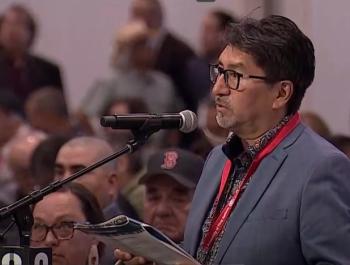Image Caption
Summary
Local Journalism Initiative Reporter
Windspeaker.com
The Assembly of First Nations has moved one step closer to conducting a possible 10-year forensic audit.
Chiefs on the second day of the AFN’s annual general assembly in Halifax July 12 voted in favour of an emergency resolution titled "Review of the past 10 years of Assembly of First Nations/National Indian Brotherhood audits".
It allows the Chiefs Committee on Charter Renewal to begin the work to prove that an independent audit of the advocacy organization is required.
Setting a scope for such an audit became necessary, said committee chair Khelsilem, because of a “lot of accusations, innuendo, different kinds of conversations” around the financial matters of the AFN.
Before being ousted as national chief on June 28, RoseAnne Archibald had called for an investigation and forensic audit of the AFN’s financial and management policies. She said corruption within the AFN made the audit necessary.
While a regular financial audit is done to provide a picture of the financial health and fair performance of a public organization, a forensic audit goes deeper to reconstruct and investigate past financial activity, often initiated in cases of suspected fraud to gather evidence for litigation.
“I think it's important for us to be able to show progress… of moving on the next steps in this path to be able to address the concerns and to be able to move forward in a good way,” said Khelsilem.
“Our hope and our desire is that there’s no wrongdoing,” he added.
Chiefs questioned that assumption.
“We’re not doing this as an academic exercise here,” said Gull Bay First Nation Chief Wilfred King. “When you call a forensic audit, you’re basically suspect(ing) wrongdoing.”
King said that even if there is bad financial management or a “bad financial transaction,” that doesn’t mean there was criminal intent to commit a crime.
R. Donald Maracle, chief of the Mohawks of the Bay of Quinte, said a forensic audit called into question the integrity of the people undertaking the financial work at the AFN, as well as national accounting firms that carried out regular audits on the books on the organization’s behalf.
He said that concerned him.
“Let’s not be headhunting people,” said Ted Quewezance, proxy for Keeseekoose First Nation. “That’s the wrong way about doing things.”
Sakimay First Nations Chief Lynne Acoose said AFN included “very little” discussion around audits.
She pointed to her own Saskatchewan nation, which held multiple session with members to discuss its annual audit.
“This resolution, I believe, it’s not about finding fraud. It’s about… assuring our people that there is good use of financial resources at the AFN and the money is being spent appropriately,” said Acoose.
Just prior to the assembly beginning, the AFN posted on its website 10 years of annual reports, each of which included regular audited financial statements.
According to the statement for the fiscal year ending March 31, 2022, the AFN operated with a budget of $39 million, the majority of which came from federal government sources. With $37.5 million in expenses, there was a surplus of $1.6 million.
The audits were not included on the agenda for the assembly.
“The AFN has always prioritized financial integrity and accountability. We want to assure First Nations-in-Assembly that the audited financial statements for the past ten years are readily accessible on the AFN website,” said interim National Chief Joanna Bernard in a statement upon the audits’ release. “These statements have undergone extensive review, and we can confirm the absence of any financial concerns.”
Khelsilem stressed that the initial work to be undertaken by the chiefs committee now was not about carrying out a forensic audit, but about putting in place the scope of the proposed work to be undertaken.
While the resolution calls for a 10-year review, he said if records were only kept for the seven years required by the law, that would change the timeframe of the review.
Khelsilem said the chiefs committee would develop the scope of the work to be done, estimate the budget of the work and present that to chiefs at an assembly with recommendations.
“It wouldn’t move forward until chiefs gave the mandate for it to move forward to the next stage,” he said.
The resolution was amended to include funding from the AFN Secretariat to complete the work required.
As the resolution was presented as an emergency resolution, it required approval from the AFN executive committee to come to the floor.
The resolution passed by a vote of 124 in support and 12 in opposition.
Local Journalism Initiative Reporters are supported by a financial contribution made by the Government of Canada.

